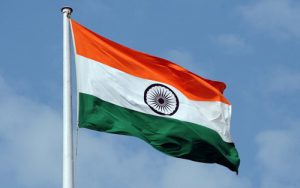“At the stroke of the midnight hour, when the world sleeps, India will awake to life and freedom.” – Jawaharlal Nehru in his famous speech ‘Tryst with Destiny’.
On 15th August 1947, India became an independent sovereign country by throwing out the yolk of colonial rule which spanned for about 200 years. But, freedom came at a heavy price. The country was partitioned into two nations – India and Pakistan, based on communal lines.

Background
- European powers started arriving in India from the 15th century onwards in search of spices and other cargo that was much prized in Europe. They came with the purpose of trade and wanted to establish trading posts in the country since the trade with India was extremely profitable.
- The first Europeans to arrive was the Portuguese in 1498. They were followed by the Dutch, the French and the English. Gradually, the English were successful at gaining the lion’s share of the trade and ousted the other powers that were largely restricted to fringe areas.
- They also took advantage of the internal rivalry among Indian powers and interfered in the internal politics. The British East India Company, which had the monopoly over the Indian trade in Britain also started annexing land and acquiring regions. Their backbone was the army which employed many Indian sepoys.
- The first major Indian region to be conquered by the company was Bengal, after the Battle of Plassey in 1757. Slowly, they annexed more areas.
- The people and local rulers started resenting the dominance and high-handedness of the Company and started revolting.
- Some of the earlier rebels were Puli Thevar (Tamil Polygar), Hyder Ali and Tipu Sultan (Mysore), Pazhassi Raja (North Malabar), Veerapandiya Kattabomman (Polygar in Tamil Nadu), and many others. The Marathas and the Sikhs also waged many wars against the British. There was a Paika Rebellion in Odisha in 1817 led by Bakshi Jagabandhu.
- Meanwhile, the sepoys also had deep-rooted animosity towards their English masters. There were mutinies in the army before the major revolt of 1857. In 1806, there was a mutiny at Vellore, though short-lived, was ruthless and shook the colonial establishment.
- The ‘First war of Indian independence’ came in 1857 when the sepoys of the Bengal army mutinied. The revolt spread to northern and central India. It was led by great leaders like Rani Laxmibai of Jhansi, Nana Saheb, Tatya Tope and others. The revolt was suppressed but it took the British almost a year to quell it.
- After the revolt, the control of British possessions in India went directly into the hands of the British government. India officially became a British colony with the Government of India Act 1858.
- Meanwhile, there were many social and religious reformers from India who strove for education of the masses and spreading awareness against prevalent superstitions.
- The Indian National Congress was formed in 1885 by A O Hume, Dadabhai Naoroji and Dinshaw Wacha. This organisation, which was formed as an organisation of the Indian elite to demand more political rights for Indians, slowly transformed into a mass organisation that worked for independence.
- From being dominated by moderate leaders, extremist leaders emerged in the party who were more aggressive in their demands and militant in their ways. They were Bal Gangadhar Tilak, Lala Lajpat Rai and others.
- The emergence of Mahatma Gandhi, later to be revered as the ‘Father of the nation’ as a leader in the INC paved the way for the party becoming a true mass party. Ordinary people also joined the freedom movement which was now a largely based in Gandhi’s ideas of ahimsa and satyagraha.
- Meanwhile, there were also revolutionaries like Bhagat Singh, Chandrasekhar Azad and others who believed in fighting colonialism with weapons. Their sacrifices are remembered by Indians even today.
- There were several movements like the Non-Cooperation movement, the Salt Satyagraha and Quit India Movement in which many people participated and also got imprisoned.
- Subhas Chandra Bose, who was initially with the INC, later formed the Indian National Army (Azad Hind Fauj) with the Indian POWs from the Second World War.
- There was a mutiny in the Indian Navy in 1946 which also shook the British government.
- Finally, the British decided to give independence to the country. However, the country was divided into two nations because of the demands of many Muslims in the country who wanted a separate homeland called Pakistan.
- The partition of the country caused large-scale violence in which lakhs of people were killed and rendered homeless.
- Nevertheless, an ancient civilisation emerged as a new country with a lot of hope and celebration on 15th August 1947.
Also on this day
1798: Birth of warrior who fought the British in Karnataka, Sangolli Rayanna. 1872: Birth of Sri Aurobindo, nationalist-turned philosopher and yogi.
See previous ‘This Day in History’ here.
Also See:
| Partition of India |
Related Links

Comments